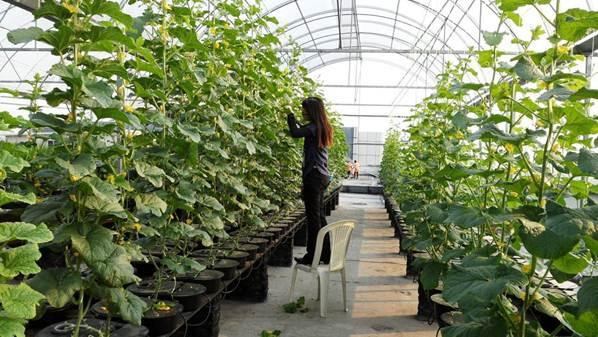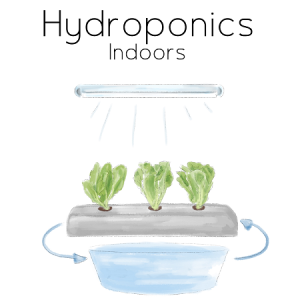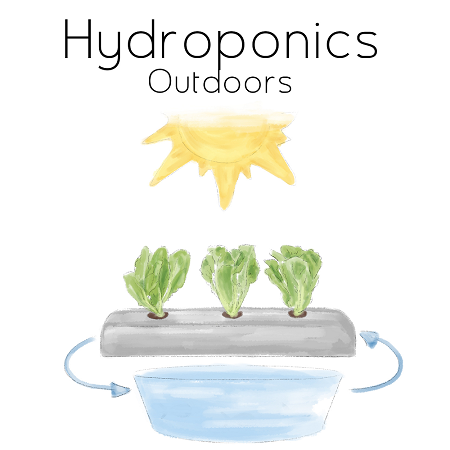What Is Hydroponics?

Hydroponics is the science of growing plants without soil. If you haven't heard of hydroponics, you may have heard of "soil-less culture" which is another name often used to describe the same thing. The same natural elements necessary for plant growth in soils are used, with the advantage that your plants are not restricted by weeds or soil-borne pests and diseases.
The History of Hydroponics
Hydroponic techniques, though they may seem to be a new technology, have been in use for centuries. The earliest known use of hydroponics are the Hanging Gardens of Babylon, the Floating Gardens of Kashmir and the Aztec people of of Mexico who used rafts on shallow lakes to grow plants. Also, hieroglyphic records in Egypt dating back to several hundred years B.C. describe the growing of plants in water. More recently, mobile hydroponic farms have been used to feed soldiers during the Second World War in the South Pacific.
Today, hydroponics is beginning to play a more important role in the world's agricultural production. Increasing populations, climatic changes, lack of water in some areas or poor quality water are all factors influencing the trend towards alternative methods of horticulture. Hydroponics is allowing many to have fresh food where normally they would have to have it shipped in or stored for long periods. A prime example of this is on Naval submarines, where hydroponics is used to supply the crew with fresh fruit and vegetables. Of more benefit is the use of hydroponics in developing countries, where it provides intensive food production in limited areas. The only restraints to a viable hydroponic system is the availability of water and nutrients. In areas where fresh water is not available, desalinated seawater can be used.
Hydroponic gardening has been used commercially since the 1970's, though it was not until recently that it has become more popular for the home grower. The demand in the community for environmental friendly and sound products has been a major factor in this trend. By growing plants in a hydroponic system, you will know exactly what has gone into the plants and can make sure that no harmful pesticides have been used that could damage your own health and the health of the environment.
How Does Hydroponics Work?
Hydroponics is a highly efficient method of growing plants. In soils, nutrients and water are randomly placed, and often plants need to expend a lot of energy to find the water and nutrients by growing roots to find them. By expending this energy, the plants growth is not as fast as it could be. In a hydroponic garden, the nutrients and water are delivered straight to the plants roots, allowing the plants to grow faster, and allowing harvesting to be done sooner, simply because the plants are putting more of their energy into growing above the ground, instead of under it.
Once a plant is established it gives higher than average yields, whether being grown in a greenhouse, a backyard or a balcony. Also, hydroponics allows you to grow more plants per square metre. This is because the plants do not need to compete with weeds and each other for the food and water that is in soil, this food and water is delivered straight to them.
It is also very important to note that, despite many myths, plants grown in hydroponics are no different to plants grow in soil, they will have the same physiology. Plants grown in a hydroponic system take the same nutrients as those grown in soil, though the content can be more accurately controlled. The basic difference between the two methods is the way in which nutrients and water are delivered to the plants.
In hydroponics, the nutrient salts are already refined and the plants do not need to wait for the nutrients to break down to their basic form. However, with soil based agriculture, plants are fed nutrients via manures and composts which must break down into their basic form (nutrient salts) before the plants can use them.
Commercially, hydroponic systems often use artificial lighting. This can make the cost of a system much more expensive. If you have sunlight readily available, then this will be unnecessary. If you don't, while the initial costs may be relatively high, many of our customers find that a lighting system, while being necessary, is not the hassle and ongoing expense they may have expected.
Advantages Of Hydroponics
A hydroponic system has the following advantages. Hydroponics allows you to grow plants more efficiently, using in some cases up to 95% less water than soil based horticulture. With many plants, hydroponics will give you a higher quality plant, at a higher yield. Other advantages are as follows:
- Slightly denser planting, allowing greater use of area you have available
- Produce looks better and lasts longer
- Water stress in hot conditions is reduced
- Suited to non-arable areas
- Plants reach maturity in much shorter time
- Soil pests and diseases significantly reduced
- Hydroponic Gardens require less maintenance
The idea of hydroponics still intimidates some people, mainly because it involves the use of some technology. However, hydroponics is a simple and easy method of growing plants, and is certainly no more difficult than growing plants in soil. We, at Aqua Gardening are experienced with hydroponics and are more than willing to introduce you to this exciting technology and help you get acquainted with it, so that you too may grow your own fresh and healthy plants.


